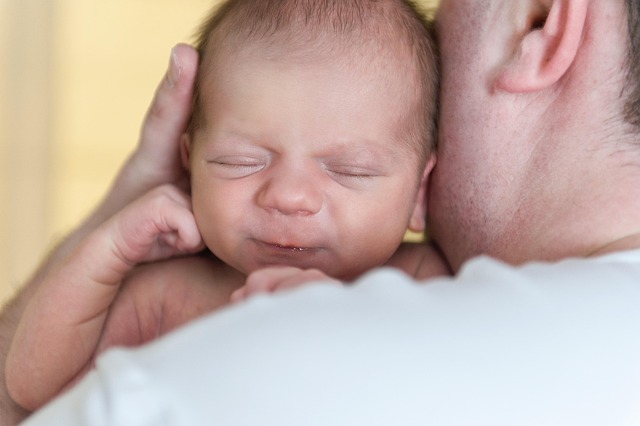

No sé cómo iniciar este post para participar en la iniciativa de @damarysvibra titulada «[Acaríciame](https://hive.blog/hive-131951/@damarysvibra/acariciame-oror-caress-me)». Y que, como ella bien explicó, podría ser abordada desde una perspectiva amplia. Menos mal que la delimitó bajo el enfoque del análisis transaccional (AT) del psicólogo norteamericano Eric Berne: una derivación de las terapias freudianas (psicoanálisis que intenta desentrañar el origen y el porqué de los comportamientos del individuo) pero aplicado en las dinámicas comunicacionales con base en roles y juegos para intervenir en las relaciones entre las personas.
Confío en haber sido lo suficientemente explícito sin aludir en la jerga psicológica. Si no, me explico a continuación.
Habrán oído la expresión: «Se le salió el niño». Sí, sé que lo han pillado… transcendió desde este contexto de la ciencia de estudio del comportamiento humano. Según Berne, la personalidad es tripartita: Padre, Adulto y Niño; equiparándola con la estructura de la segunda tópica psicodinámica de Freud: Superyó, Yo y Ego; y en tal sentido, se expresa cuando nos relacionamos con otros a través de la comunicación verbal y no verbal. El propósito del AT es identificar qué rol y en qué juego participan las personas para hacerlos conscientes y armonizar los mensajes para así evitar malos entendidos y emociones negativas o conflictivas.
Por ejemplo, imaginen que alguien dice: «Siempre haces todo mal». Si responde desde el Niño, podría sentirse culpable o rebelarse. Si responde desde el Adulto, podría analizar la crítica objetivamente. No sé si se podría responder desde el Padre. En cualquier caso, el AT enseña a elegir conscientemente desde qué estado responder para evitar caer en juegos psicológicos destructivos.
Si no me falla la memoria, el Superyó equivale al Padre, en cuanto al estadio de las reglas y normas; el Yo al Adulto, el que analiza las situaciones a través de la razón; y el Ego al Niño, quien actúa por la emoción básica y visceral del querer. Lo sano es que estén equilibrados y comunicados para poder ajustarse cuando se comunican con otros.
Así que, en mi opinión, no estaría de más que le echen un vistazo a esta teoría y probarla. Claro, a sabiendas de que en situaciones complicadas no hay que dudar en acudir a los profesionales: psicólogos y psicoterapeutas.
Con esto en mente, creo que estoy en condiciones de contestar las preguntas al ruedo desde la experiencia e interpretación.
Sin temor a equivocarme, entiendo que las caricias son vehículo de un mensaje amoroso en su connotación más amplia. Y en este sentido, ¿quién no querría recibir una caricia?
Más de uno, me consta.
Empezaré con mi amigo Tommy. Sí, él es un pequeño Yorkshire que compramos hace casi quince años. Ha perdido ya algunos dientes, pero todavía mantiene un temperamento vivaz y protector. No hay que equivocarse por su tamaño y peso (casi tres kilos). Él podría matarlos de ternura. Recuerdo que de cachorro le molestaba mucho que lo acariciaran. Gruñía hasta zafarse de cualquier abrazo. Supongo, una reacción instintiva heredada, producto de la evolución. Bueno… alterada por la intervención humana. Ahora, él me busca cuando mi esposa está fuera u ocupada para que le rasque la cabeza hasta adormecerse. Aprendió que esa caricia es un mensaje de amor.
«Epa», me dirán… «No se trata de mascotas».
¡No estén muy seguros!
Para empezar, Tommy no es una mascota, en el sentido estricto. Es un ser sensible que nos acompaña en el camino. Quizás, por eso, los de su especie son considerados como los mejores amigos del hombre. Y eso es Tommy para nosotros. Por otro lado, el que lo haya traído como ejemplo es para contrastar un hecho sutil, pero fundamental. Si Tommy fue capaz de entender el real mensaje de una caricia, ¿qué excusa tendrían las personas para evitar las caricias?
Podrían que conozcan a alguien huraño que rehúya de cualquier contacto. Quizás, podría haber alguno entre nosotros. Pues, no se extrañen. La calidad del trato en la niñez determina, para bien o para mal, a las personas. Probablemente, los huraños guarden en el inconsciente abusos o carencias causadas en los primeros años de sus vidas y que luego se manifiestan en conductas aprensivas, defensivas y en los peores de los casos en destructivas.
No pretendo competir con psiquiatras, pero sospecho que vivimos en una civilización que atenta contra sus miembros, y en su afán de progreso material y en un hedonismo desvirtuado que destruye las bases de lo esencial de la familia: el amor que une.
En tal sentido, creo que el reto no está en buscar o esperar las caricias de los demás. Si no en dar amor conscientemente, enseñando a quien lo recibe, que no es un derecho merecido; en realidad es un regalo inestimable que debe ser correspondido, no por conveniencia social e interés. Al contrario, sentido y genuino, en la comunión que se amalgama en el amor mismo.
Una palabra amable, un abrazo fraternal son suficientes si están cargados de amor para combatir la desesperanza y la desazón, la amargura y el agobio de un mal día. Sé el motor de esa energía y contagia a tu entorno. No te quejes, enseña. No esperes, toma la iniciativa con respeto y comprensión. El mundo necesita personas que sepan dar y recibir caricias. Personalidades armoniosas y equilibradas que no jueguen a la soberbia, que caminen el sendero de la humildad. Sí, habrá obstáculos, caídas y heridas, pero al final, habrá que levantarse y sanar, y no hay mejor remedio que el amor en una caricia.
Así que, hoy, Intenten dar una caricia sincera a alguien que conozcan, sin esperar nada a cambio.

A mi amigo Tommy le gusta que lo acaricien

Unas divagaciones de @janaveda
La portada fue creada a partir de la imagen de Iuliia Bondarenko en Pixabay.
¡Cansado! ¿Ya no te satisfacen las redes sociales tradicionales?
Entonces, te invito a conocer Hive presionando aquí.
Únete a nuestra comunidad global, en donde la libertad sin censura en nuestro norte.



Ramblings that caress
I don't know how to start this post to participate in @damarysvibra's initiative titled "[Caress Me](https://hive.blog/hive-131951/@damarysvibra/acariciame-oror-caress-me)." As she explained, it could be approached from a broad perspective. Luckily, she narrowed it down to the transactional analysis (TA) approach of the American psychologist Eric Berne: a derivation of Freudian therapies (psychoanalysis that attempts to unravel the origin and reasons behind an individual's behavior) but applied to communication dynamics based on roles and games to intervene in interpersonal relationships.
I trust I've been clear enough without resorting to psychological jargon. If not, I'll explain below.
You may have heard the expression: "The child came out." Yes, I know you've caught on… it originated within the field of human behavior. According to Berne, personality is tripartite: Parent, Adult, and Child; equating it with the structure of Freud's second psychodynamic topography: Superego, Ego, and Ego. And in this sense, it is expressed when we relate to others through verbal and nonverbal communication. The purpose of Transactional Analysis (TA) is to identify which role and game people are playing in order to make them aware of it and harmonize messages, thus avoiding misunderstandings and negative or conflicting emotions.
For example, imagine someone says, "You always do everything wrong." If they respond from the Child ego state, they might feel guilty or rebel. If they respond from the Adult ego state, they might analyze the criticism objectively. I don't know if they could respond from the Parent ego state. In any case, TA teaches us to consciously choose which state to respond from to avoid falling into destructive psychological games.
If my memory serves me right, the Superego is equivalent to the Parent ego state, in terms of rules and norms; the Ego to the Adult ego state, which analyzes situations through reason; and the Child ego state, which acts on the basic and visceral emotion of wanting. The healthy state is for these ego states to be balanced and in communication so they can adjust when communicating with others.
So, in my opinion, it wouldn't hurt to take a look at this theory and try it out. Of course, knowing that in complicated situations, you shouldn't hesitate to seek professional help: psychologists and psychotherapists.
With this in mind, I think I'm in a position to answer the questions posed from my experience and interpretation.
Without fear of being wrong, I understand that caresses are a vehicle for a loving message in its broadest sense. And in this sense, who wouldn't want to receive a caress?
More than one person, I know.
I'll start with my friend Tommy. Yes, he's a little Yorkshire Terrier we bought almost fifteen years ago. He's lost some teeth, but he still maintains a lively and protective temperament. Don't be fooled by his size and weight (almost three kilos). He could melt your heart with cuteness. I remember that as a puppy, he really disliked being petted. He would growl until he got away from any hug. I suppose it's an inherited, instinctive reaction, a product of evolution. Well… altered by human intervention. Now, he seeks me out when my wife is out or busy so I can scratch his head until he falls asleep. He's learned that this caress is a message of love.
"Hey," you might say… "It's not about pets."
Don't be so sure!
To begin with, Tommy isn't a pet, strictly speaking. He's a sentient being who accompanies us on our journey. Perhaps that's why his kind are considered man's best friend. And that's what Tommy is to us. On the other hand, the reason I've brought him up as an example is to highlight a subtle but fundamental point. If Tommy was able to understand the true message of a caress, what excuse would people have for avoiding affection?
They might know someone withdrawn and shuns any physical contact. Perhaps there could be someone like that among us. Well, don't be surprised. The quality of treatment in childhood determines, for better or for worse, who a person becomes. Those who are withdrawn likely harbor unconscious abuse or deprivation from their early years, which later manifests as apprehensive, defensive, and, in the worst cases, destructive behaviors.
I don't intend to compete with psychiatrists, but I suspect we live in a civilization that harms its own members, driven by a thirst for material progress and a distorted hedonism that destroys the very foundation of what is essential to family: the love that unites.
In this sense, I believe the challenge lies not in seeking or expecting affection from others, but in consciously giving love, teaching the recipient that it is not a right to be earned; it is, in fact, a priceless gift that must be reciprocated, not out of social convenience or self-interest, but rather with genuine feeling and sincerity, in the communion that is forged in love itself.
A kind word, a warm embrace, are enough if they are filled with love to combat despair and unease, bitterness, and the overwhelm of a bad day. Be the driving force behind that energy and spread it to those around you. Don't complain, teach. Don't wait, take the initiative with respect and understanding. The world needs people who know how to give and receive affection. Harmonious and balanced personalities who don't play the role of pride, who walk the path of humility. Yes, there will be obstacles, falls, and wounds, but in the end, we must get up and heal, and there is no better remedy than the love in a caress.
So, today, try giving a sincere caress to someone you know, without expecting anything in return.

My friend Tommy likes to be caressed

A ramblings by @janaveda in Spanish and translated to English using https://translate.google.com
The thumbnail was created from image by Iuliia Bondarenko on Pixabay.
Tired...! Are you no longer satisfied with traditional social media?
Then I invite you to get to know Hive by clicking here.
Join our global community, where uncensored freedom is our north.
